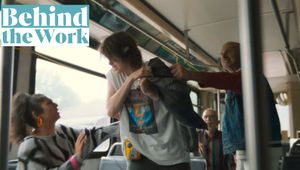
Are Electric Vehicles and Car Sharing the Future of Mobility? Zipcar Thinks So

The conversation around gas guzzling cars, pollution and electric vehicles (EVs) has reached a fever pitch in the UK - particularly in London, where the mayor Sadiq Khan has expanded his ULEZ scheme to charge drivers of the most polluting vehicles.
All of this lends an extra spice and salience to a new campaign for car-sharing club Zipcar, which focuses on encouraging British drivers to get over their misapprehensions about EVs. The company has partnered with TV presenter Sam Thompson to follow him during his first ever experience driving an EV, and to show why Zipcar is an ideal way to at least have a go.
The campaign also comes as Zipcar drives forward its mission to have a fully electrified fleet of vehicles on offer by 2025 - currently, they have 1,000 EVs available for members to use.
Zipcar UK’s general manager James Taylor caught up with LBB’s Laura Swinton to talk about the new push and the business’s longer term strategic vision.
LBB> What was the business need behind this particular campaign?
James> While debate around the challenges of electric vehicle usage is at a high in the UK, at Zipcar we have had electric cars in our UK fleet since 2018. We are keenly aware of how important they are for contributing to cleaner air for us all, but also know first-hand how popular they are with members of the public once they’ve given an EV a go. As such, the main business goal for this campaign was to ease some of the common misconceptions around EVs and encourage Brits to trial electric driving through car sharing with us.
LBB> And can you tell me about the strategy that you've landed on to help Zipcar address that?
James> We wanted to demonstrate how easy, simple and enjoyable it is to drive an EV. That is why we partnered with TV personality Sam Thompson to capture his reaction to his first-ever trip in an electric vehicle – to showcase how fun and straightforward it can be!
We also wanted to debunk the common misconceptions the general public are feeling towards EVs and their use, which is why we surveyed both EV and nonEV drivers. Our surveys uncovered the specific uncertainties felt by Brits around the use of them, which is holding people back from going electric. This includes how far the type of car can be driven, how to charge them and, most surprisingly, whether they can be driven in the rain!
LBB> Why was Sam Thompson specifically the right person to partner with?
James> Sam's audience really resonated with our target demographic. Hailing from London and situated within the core Zipcar member age range, he was a natural fit for this activity. It was Sam's infectious humour that we also really thought would resonate with our prospective audience – which he used to help steer the execution brilliantly.
LBB> What's Zipcar's vision for the future of mobility?
James> Zipcar is the UK’s biggest and most popular car-sharing club, driven by a mission to change the way people think about driving in cities around the world. With over 1,000 electric cars available to hire, and with Zipcar covering the cost of charging, we give members of the public an easy and affordable way to give it a go.
We’ve developed a vision to be fully electric by 2025 which is in line with our goal for EV car sharing to be the future of mobility and the solution for greener driving in the UK.
LBB> And looking at the state of the way we drive now, what are the main obstacles standing in the way of that vision?
James> Zipcar members love our electric vehicles, but we know there are concerns holding some people back from trying one for the first time - most notably range anxiety. To break down these barriers we are trying to destigmatize the myths around EVs by encouraging members to see for themselves how straightforward and enjoyable it is.
Our recent data shows that 48% of non-EV drivers in the UK, who would feel uncomfortable driving an electric vehicle, have said they wished they could trial one. Similarly, 78% of EV drivers across the UK wish they'd known more about electric vehicles before they started using one. This ambiguity about what electric driving actually feels like is our biggest obstacle to overcome, which is why we’re encouraging drivers to test one in a Zipcar without the emotional or financial commitment of buying one.
LBB> Looking at the UK specifically, the journey towards EV adoption has not been straightforward. Where other countries like Norway are subsidising EVs, the UK is going back and forth on green policies, and right now the ULEZ controversy is highlighting some real resistance to ditching polluting vehicles. From your perspective, what's the most effective way to encourage people to try or adopt EVs within the UK cultural context?
James> Education has been and will always continue to be a key part of our member communications, and this is especially important when it comes to talking about our electric vehicles. We work hard to ensure all members have the information they require to feel at ease driving a new vehicle, with a real emphasis on answering the key concerns members may have when it comes to EVs.
LBB> When you're thinking about Zipcar's competition in the marketplace, is it just other car rental platforms or do you see it more broadly?
James> We’re on a mission to enable simple and responsible urban living, a future filled with more car-sharing members than car owners in major cities across the globe. We offer members of the public access to four wheels when they need one – be that for a long weekend away with luggage, nipping to their friends’ place with a birthday cake or moving house.
Independent research regularly shows that those who drive with car-sharing clubs like Zipcar take fewer car journeys but also take public transport and walk and cycle regularly too. As such, we are confident of our role in driving the future of transportation forward.
LBB> You've worked in this space for a long time - how are consumer behaviours and attitudes changing?
James> While consumer behaviours and attitudes are certainly becoming more widely accepting towards EVs and carsharing, we are still a long way off electric becoming the new normal. We know that our members hugely enjoy driving our electric vehicles and are aware that consumer perceptions are changing all the time. That said, ongoing education for our members around EVs – and to the public about their ability to trial an EV with Zipcar - will be key. However, it is reassuring to see people giving electric vehicles a try, proven by how popular they are with members of the public once they’ve given an EV a go.
LBB> You're leading Zipcar's push to fully electrify by 2025 - how's that going and what have been the unexpected challenges and surprisingly smooth elements of that transition?
James> There are lots of factors that contribute to our push to be fully electric by 2025, only some of which are in our control. A number of organisations and bodies will need to enable this to happen – from local authorities and councils to commercial businesses.
Zipcar is committed to continuing to expand its fleet – we have over 1,000 now, the highest number of any car-sharing club in the UK – but must do this in line with the expansion of charging networks within the UK.
LBB> EVs have been around for a while but the tech keeps evolving - to what extent are people put off EVs based on outdated experiences or information?
James> Whilst there has been a significant increase in the use of electric vehicles in the UK, we know many motorists still feel unsure about the many ways in which EVs can be driven, which is impacting the adoption of EV driving. One of the key concerns from the public is around range – and whilst the range on the most recent models of vehicles has improved dramatically since the earliest EV models, it is understandable that many will still have concerns about this given it is a new way of travelling for most.
These concerns could be eased by trialling an electric vehicle or adopting car-sharing through a car-sharing service such as Zipcar, so drivers can feel the unparalleled experience of driving electrically, without the pressure and expense of owning one.
LBB> What role can a platform like Zipcar play in changing attitudes across society more broadly?
James> Car sharing clubs like Zipcar have a key role in changing attitudes across society more broadly. Car sharing breaks the dependence on privately owned vehicles and is proven to reduce the number of privately owned vehicles on our city’s streets - giving us more space, improved air quality and generally better city living.
By trialing an EV through a car-sharing club like Zipcar, we hope to change consumer attitudes and break down common misconceptions about their usage which in turn will help to create cleaner cities.















